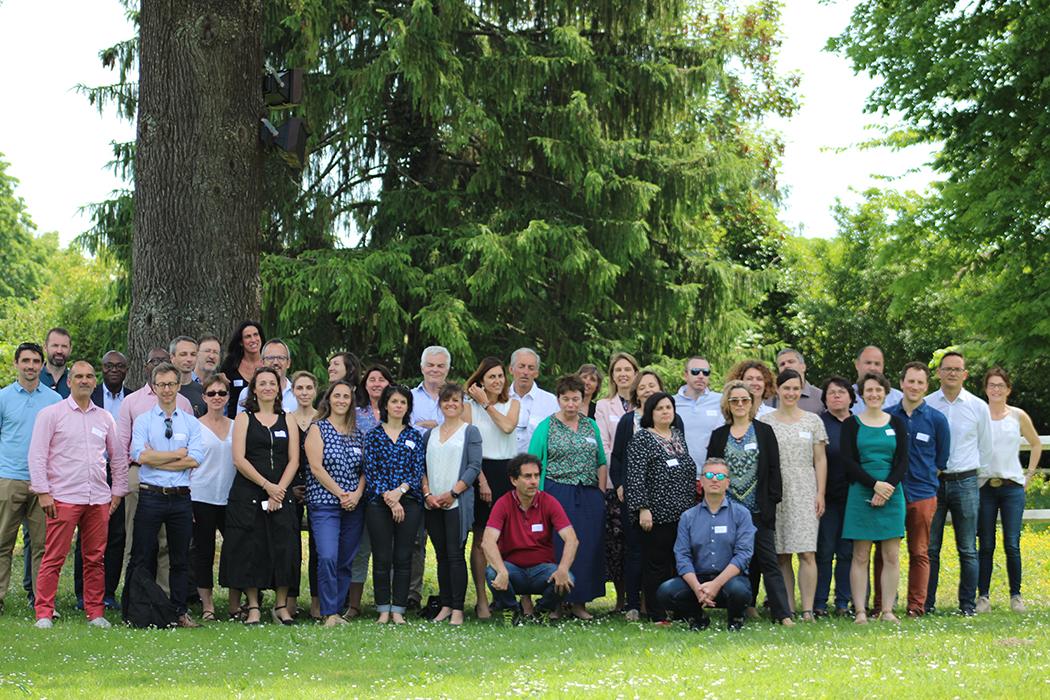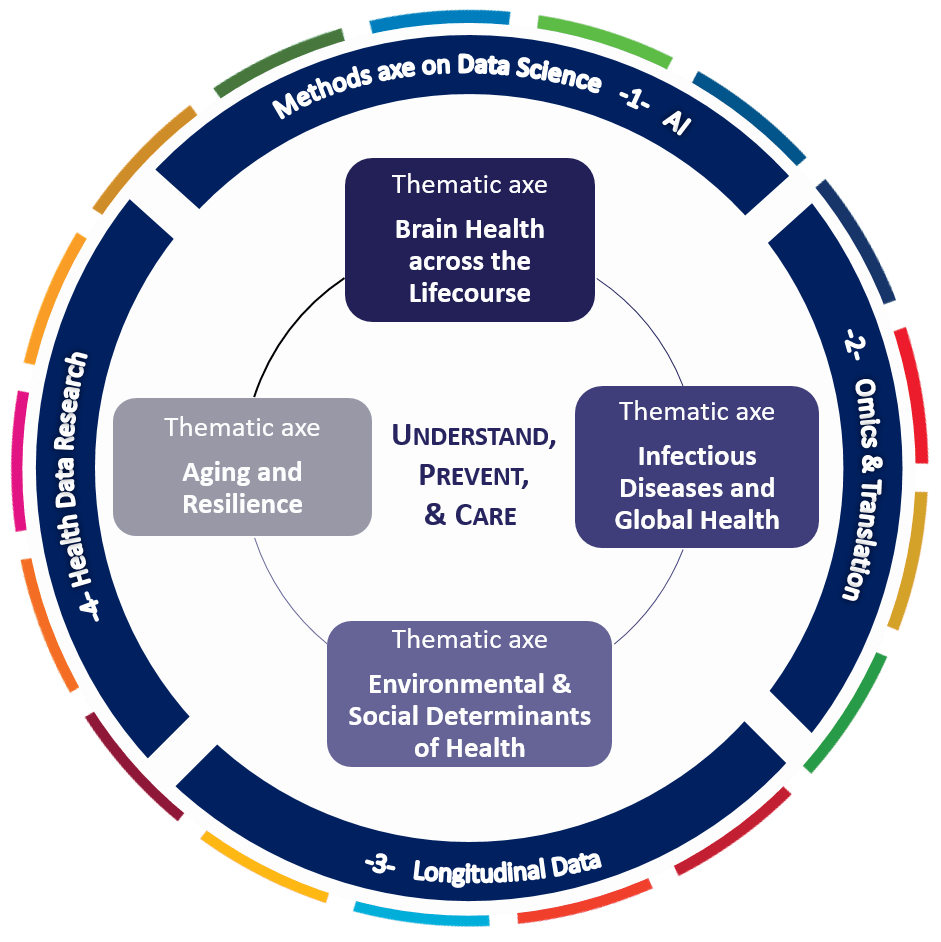Presentation
The BPH brings together over 500 staff members with a common goal : to explore and address major public health priorities with a multidisciplinary perspective and robust methodology approaches.
The BPH comprises 10 research teams, as well as a scientific coordination across teams covering
Brain health across the lifecourse
Data science (AI, omics, real world data, longitudinal studies)
Infectious diseases and global health
Aging and resilience
and Environmental and social determinants of health.
The tight collaboration of biostatisticians and data scientists with epidemiologists and clinicians allows the rapid development and timely application of cutting-edge methods.
An important methodological focus since inception has been prediction modelling, leveraging high-dimensional biological information and machine learning algorithms. Population neuroscience and global health are also longstanding key components of the BPH with an extensive track record and numerous collaborations with clinicians at Bordeaux University Hospital and with middle- and low-income countries (international associated laboratory in Abidjan) respectively.

Organization and
Year Book
The Research center is directed by Professor Rodolphe THIEBAUT.
He is assisted by Isabelle BELY serving as Secretary General and coordinator of the BPH administrative staff.
Previous Yearbooks :
Governance

Steering Committee
- The Steering Committee meets once a month to deal with urgent matters and prepare documents for the Board of Directors.
- It is composed of team managers & directors
Board of Directors
The Board of Directors is composed of the directors and deputy directors of the 10 BPH teams. It meets on a monthly basis and discusses and approves (through a vote whenever needed) strategic decisions regarding funding, recruitments, promotions, scientific directions, governance, IT infrastructure, communication with host institutions, etc.
Lab Council
The Lab Council is composed of team directors, administrative service leaders, and elected staff representatives. Its members discuss and approve (through voting whenever needed) practical and strategic aspects related to the BPH.
General Assembly
The General Assembly (GA) gathers all staff members once a year to provide updates and discuss and approval of practical and scientific aspects related to the BPH. The GA of the BPH meets jointly with the GAs of the ISPED and the Department of Public Health (staff largely shared).
Scientific Advisory Board
Actuellement en cours de nomination pour le mandat 2022-28.
Administrative and technical support
- Secretary General : Isabelle Bely, in charge of coordinating the administrative staff (human resources, grant management, communication, library).
- Thierry Voyemant, director of the CREDIM IT infrastructure, a University of Bordeaux Platform embedded in the Department of Public Health Research.
Administration & Common Services
The central administrative services are
BPH general secretariat, headed by Isabelle Bely (General Secretary), comprises:
Christine Lopes Monteiro – Hervé Annette
Nadine Simon – Sandrine Darmigny
Valérie Garcia – Laetitia Houinou – Marie-Hélène Carere – Nicolas Koskas
Lucie Bonnafous Besse
Catherine Fagard-Sultan
Research Organization
The BPH is devoted to producing innovative research based on robust methodology to address a wide range of public health challenges.
Research teams
The Center is composed of 10 complementary research teams gathering basic and clinician scientists, healthcare professionals, technicians and engineers, post-doctoral fellows, PhD and undergraduate students who work together towards a common goal.
Scientific coordination across research teams
To foster interaction across teams, strengthen collaboration in the center’s domains of excellence and enhance our competitiveness in competitive grant applications we have established a scientific coordination across teams organized around 5 themes, which also reflect our main areas of expertise:
- Brain health across the life course
- Data science (AI, omics, real world data, longitudinal data)
- Infectious diseases and global health,
- Aging and resilience,
- Environmental and social determinants of health.
BPH research organization is also based on major cross-sectional research themes with the aim of:
- Increase international visibility of the center’s areas of excellence,
- Create opportunities for collaboration across its 10 teams,
- Prioritize themes linked with Horizon Europe topics,
- Organize weekly seminars around these cross-sectional themes,
- Support early career researchers.


Research environment
The BPH is co-hosted by Inserm and the University of Bordeaux. Two BPH research teams have a third host institution, INRIA (SISTM team) and IRD (GHiGS team).
The center is located within the University of Bordeaux campus, one of the largest university campuses in Europe, and specifically on the Carreire biomedical campus, close to Institute of Public Health & Development (Isped). The BPH is situated within walking distance from Bordeaux University Hospital, with which it entertains strong connections.
Many clinicians (neurologists, psychiatrists, infectious disease specialists, oncologists, emergency medicine specialists, etc.) participate actively in BPH research projects or even lead some of the research teams. Within Bordeaux University Hospital, BPH researchers also lead the medical information department, a unit for innovation in prevention, and the occupational health unit for research organizations.
Research at the University of Bordeaux is divided into 11 departments, each bringing together different research structures (joint research units, university teams, platforms, etc.). The department of Public Health, directed by a BPH team leader Prof. Antoine Pariente, comprises the Bordeaux Population Health Research Centre with its 10 research teams, the Clinical Investigation Centre (CIC 14.01), and, since September 2022, the service unit MART (Methods and Applied Research for Trial).

Key figures in 2024
Staff members
Research teams
Scientific papers
PHD students
Ongoing research
contracts





